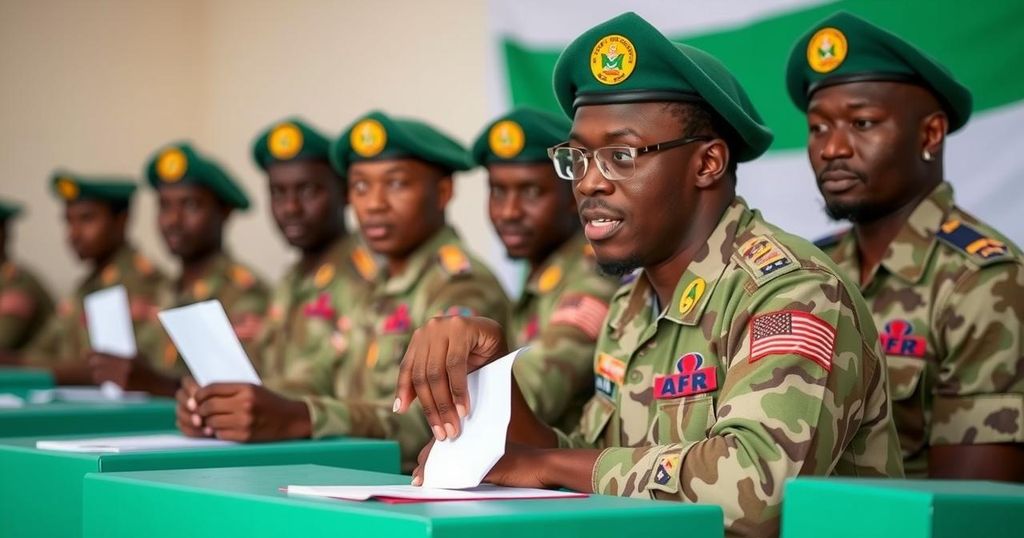Chad’s Elections Under Threat: Calls for Military Protection Amid Violence
Chad’s electoral commission has called on the military for protection leading up to the December 29 elections due to rising attacks on election officials and candidates. Opposition supporters have clashed violently with ruling party campaigners, prompting concerns over potential armed conflict. A coalition of opposition parties has denounced the elections as a facade designed to reinforce the existing government’s power amidst claims of manipulation and pre-determined outcomes.
Chad’s electoral commission has urgently requested assistance from the military to ensure the safety of election officials and candidates as the nation approaches the December 29 elections amidst increasing violence. Reports indicate that opposition supporters have resorted to physical confrontations, employing clubs and iron bars to obstruct campaign activities of the ruling Patriotic Salvation Movement (MPS) party across multiple cities. The National Election Management Agency (ANGE) has highlighted the pervasive disruptions affecting the ongoing campaigning for both parliamentary and local elections, raising concerns about escalating tensions that may lead to armed conflict if military protection is insufficient.
The upcoming elections signify the conclusion of a prolonged transitional period that commenced following the death of former President Idriss Deby Itno in April 2021. As per ANGE Vice President Assane Bairra’s statement, the situation’s volatility necessitates the deployment of military personnel to safeguard rightful campaigning practices. With over 8.3 million citizens registered to participate in the electoral process, around 180 political entities have nominated approximately 1,300 candidates for parliamentary runs, in addition to thousands vying for local council and provincial seats.
Nevertheless, a collective of over 75 opposition factions and civil organizations has labeled the forthcoming elections as a mere “masquerade,” asserting that President Mahamat Idriss Deby Itno is orchestrating these elections to entrench his authority. Further, reports indicate that violence has erupted as opposition activists have attacked MPS campaign caravans in regions including Ndjamena, Bongor, Abeche, Lai, and Moundou. In some instances, the military intervened, dismantling opposition-set roadblocks, thereby facilitating MPS campaigning efforts.
Opposition leader Avocksouma Djona has expressed his party’s grievances regarding the integrity of the election process, arguing that all election management officials owe their appointments to Deby, who also controls the constitutional court. There are substantial fears that this judicial influence may lead to predetermined outcomes that favor his party. While Deby maintains that the electoral process will be conducted transparently, opposition groups have promptly refuted such claims, citing concerns for potential election rigging to sustain his power.
Furthermore, Deby ascended to leadership as Chad’s transitional president in April 2021 after the death of his father, who had previously ruled for 30 years. Although initially promising to restore civilian governance in an 18-month timeframe, Deby subsequently extended this transition by an additional two years while asserting victory in disputed elections held in May 2023, which many opposition parties chose to boycott.
The current political climate in Chad is fraught with tension as the country prepares for significant elections on December 29, intended to restore civilian governance following a prolonged transitional period. The backdrop to these elections is marked by the death of President Idriss Deby Itno in 2021 and has been characterized by transitions of power that raise questions regarding electoral fairness and the influence of the ruling party, the Patriotic Salvation Movement (MPS). The requests for military protection underscore the potential volatility surrounding these upcoming elections, highlighting concerns about civil unrest and the integrity of the democratic process in Chad.
In summary, the upcoming elections in Chad present a critical juncture for the nation as it seeks to transition back to civilian rule following a tumultuous period under military governance. The requests for military protection reflect the heightened tensions and violence surrounding the electoral process, primarily driven by opposition resistance to the ruling party’s influence. As the situation evolves, the integrity of the elections will remain under scrutiny, particularly in light of claims from opposition factions regarding potential election manipulation.
Original Source: www.voanews.com




Post Comment